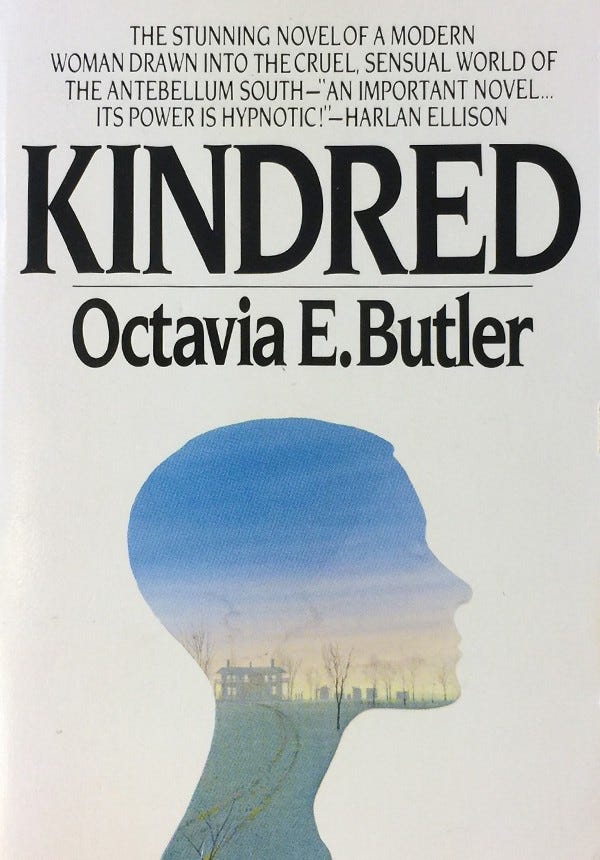In the realm of activism, do you see yourself as a superhero or a pixel?
Two more environmental lenses, inspired by Octavia Butler's novel Kindred
“I want to be a pixel of peace.”
My last post was about the lenses through which we see life in general, and environmentalism in particular.
Today, I have two more lenses to introduce: the superhero lens, and the pixel lens.
Here’s how I define them:


I started thinking about these lenses after reading Octavia Butler’s novel Kindred.
In Kindred, a modern-day black woman and her white husband get yoked, against their will, into the antebellum South.
One thing that stuck me about Kindred is how powerless the modern-day couple is to change Southern society.
The attitude that black people are inferior is firmly engrained into the minds of people back then — both black and white. This conditioning starts in childhood. Check out this passage, where the modern couple witness black children at play:
We approached them from one side…They went on with their play as we watched and listened.
“Now here a likely wench,” called the boy on the stump. He gestured toward the girl who stood slightly behind him. “She cook and wash and iron. Come here, gal. Let the folks see you.” He drew the girl up beside him. “She young and strong,” he continued. “She worth plenty money. Two hundred dollars. Who bid two hundred dollars?”
“You shut your mouth,” said the boy. “You ‘aint supposed to say nothing. When Marse Tom bought Mama and me, we didn’t say nothing.”
I turned and walked away from the arguing children, feeling tired and disgusted.
Later on in the chapter, Dana, the main character has this to say:
The ease seemed so frightening…The ease. Us, the children…I never realized how easily people can be trained to accept slavery.
In a similar way, we are trained that the environmental degradation around us is “normal.” It’s normal that everything we buy is wrapped in single-use plastic, forests are being chopped down, shale is being fracked, etcetera, etcetera.
In the book Sapiens, Yuval Noah Harrari says that one of the things that defines human beings is our ability to believe in collective stories:
Much of history revolves around this question: how does one convince millions of people to believe particular stories about gods, or nations, or limited liability companies?
In our present-day culture, there are stories many people believe that enable environmental destruction. Here are two examples:
“GDP must always increase”
“We humans have the right to take whatever we want from nature”
Much like the characters in Kindred, we’ve been enculturated into these stories from a young age by a million subtle messages.
It’s really hard to live in this society and not be affected by these stories. As my friend Matthew said, “This all started way before you.”
We were thrown into this modern world with its particular cultural and economic currents. Changing the direction of these currents is damn hard. It requires diligent work, against powerful forces of inertia. Millions of people earn their livelihoods from keeping our economy sailing down the same unsustainable course it has been on since the start of the industrial revolution.
One way to define “an activist” is somebody who is trying to steer the ship of culture in a new direction. Activists will inevitably face resistance and inertia.
Let’s return to the two lenses on activism I introduced above:
As activists, we can look at ourselves as superheroes. Through this lens, we each have the ability to make tremendous change. If we don’t succeed, then we are not living up to our full potential.
When I’ve used this lens to look at myself in the past, I’ve always felt inadequate for not doing enough. The superhero lens is a variant of perfectionism, and it leads to shame and burnout when the superhero fails to live up to the grand expectations she sets for herself. Alternatively, even if the superhero succeeds, there is a sense of ego since the superhero does not acknowledge the other people who were also involved in changemaking.
Alternatively, we can look at ourselves as pixels. No one individual pixel has the power to “save the world.” When I look at myself through this lens, I feel a sense of relief, and an increase in energy. The weight of the world is no longer only on my shoulders. I can share the weight with others. I can do my best, then go home and take care of myself, so that I have the energy to show up on another day.
The pixel lens encourages awareness of connection, community, and interdependence. No one pixel can “save the world,” but a pixel can team up with her community to make great things happen.
We live in a culture of exceptionalism, a culture that celebrates “heroes.” Consider MLK. Though he was a very impressive man, he was just one human in a long chain of brave and diligent souls. He was one pixel in a community of activists who moved, and are continuing to move, the civil rights needle.
Our culture loves superheroes. The “hero’s journey” is a proven formula for movies and books. But looking at activism through the lens of the hero’s journey can lead to burnout, shame, and ultimately, less activism.
I’m ready to put down the superhero lens. I’m ready to lower expectations for myself. Paradoxically, I think this will make me more effective and energized, because I’ll be able to act without needing my actions to be grand or perfect.
Ultimately, activism is not the story of a singular hero saving the day. It is the story of many pixels working together to create a new kind of picture.
...
Thanks to Tim Falls for feedback





